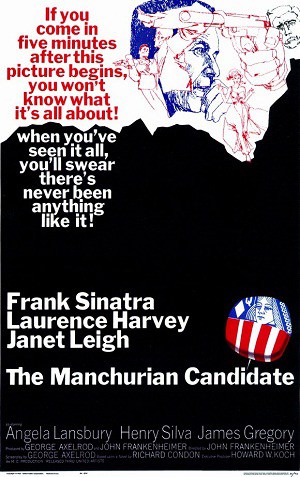An idea once unbelievable. . . .
Then unthinkable. . . .
Now all too possible. . . .
A chilling classic.
In the recent war in Iraq and the current one in Afghanistan, the greatest threat and concern has been and is—torture. Although torture had also been a concern in the Korean conflict, larger still perhaps was the threat of brainwashing. While Seven Days in May (1964) is centered on a planned military takeover of the U.S. Government, The Manchurian Candidate (1962), both directed by John Frankenheimer, is about a possible political coup of the government. By assassinating a presidential candidate, a Soviet operative in the U.S. hopes to make way for a Communist nominee and, conceivably, the future president. This is accomplished through the programming—the brainwashing—of an American soldier who had fought in Korea.
After their brainwashing sessions by the Communists in Manchuria, three released prisoners return to the States. One, Captain Raymond Shaw (Laurence Harvey), arrives a hero, recipient of the Medal of Honor, and is greeted at the airport by his mother, Eleanor (Angela Lansbury), and his stepfather, the U.S. senator John Yerkes Iselin (James Gregory). Eleanor is manipulative and domineering, her second husband a wimp, easily stage-managed. Raymond’s feelings toward his mother are unhesitating and succinct: “I didn’t always hate her. When I was a child, I only kind of disliked her.”
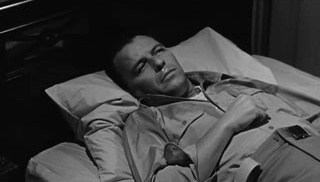 The second returning soldier is Major Bennett Marco (Frank Sinatra). It is when the third, Corporal Allen Melvin (James Edwards), shares with him a recurring nightmare of his brainwashing ordeal that Marco senses that something isn’t right. “I tell you,” he says to his boss in Army Intelligence, Colonel Milt (Douglas Henderson), “there’s something phony about me, about Raymond Shaw, about the whole Medal of Honor business.”
The second returning soldier is Major Bennett Marco (Frank Sinatra). It is when the third, Corporal Allen Melvin (James Edwards), shares with him a recurring nightmare of his brainwashing ordeal that Marco senses that something isn’t right. “I tell you,” he says to his boss in Army Intelligence, Colonel Milt (Douglas Henderson), “there’s something phony about me, about Raymond Shaw, about the whole Medal of Honor business.”
Add to these suspicions and anxieties, Marco has experienced the same nightmare, over and over, every night. He is impassively witnessing an equally impassive Shaw, both obviously deep into their indoctrination, shoot dead a fellow American soldier (Tom Lowell) upon the instructions of a Korean interrogator, Dr. Yen Lo (Khigh Dhiegh).
Further, Marco feels he has been programmed. When asked his opinion of Shaw, he automatically replies, “Raymond Shaw is the kindest, bravest, warmest, most wonderful human being I’ve ever known in my life.” Corporal Melvin says the exact same thing when asked about Shaw. Marco knows better: “It isn’t as if Raymond’s hard to like. He’s impossible to like! In fact, he’s probably one of the most repulsive human beings I’ve ever known in all of my life.”
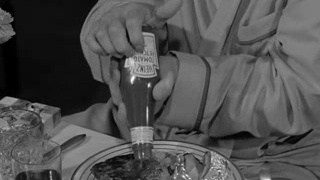 Running counter to this story line but much intertwined with it, is Senator Iselin’s political career and, in McCarthy-like announcements, his claim that there are a such-and-such number of Communists in the U.S. Defense Department. But the exact number varies with each cue from his wife—now 207, later 104, then 275—until finally, during a meal, an exasperated Iselininsists that they agree on a number. At the time, he is putting ketchup on his steak from a Heinz 57 Varieties bottle. It’s decided: in his next public announcement—there are fifty-seven Communists in the Defense Department.
Running counter to this story line but much intertwined with it, is Senator Iselin’s political career and, in McCarthy-like announcements, his claim that there are a such-and-such number of Communists in the U.S. Defense Department. But the exact number varies with each cue from his wife—now 207, later 104, then 275—until finally, during a meal, an exasperated Iselininsists that they agree on a number. At the time, he is putting ketchup on his steak from a Heinz 57 Varieties bottle. It’s decided: in his next public announcement—there are fifty-seven Communists in the Defense Department.
In a film with little humor, this is a welcomed light touch, though Dr. Lo wittily plays with American slang and makes fun of the financial system of capitalism.
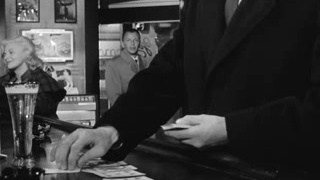 Believing his growing suspicions have a connection with Raymond, Marco befriends him. Soon after, a bizarre incident occurs. At a bar where the two are to meet, and before Marco arrives, Raymond overhears the bartender say to a patron, “Why don’t you pass the time by playing a little solitaire?” Raymond promptly asks for a deck of cards and begins playing. Marco enters as the bartender continues, “Why don’t you go and take yourself a cab to Central Park and go and jump in the lake?”
Believing his growing suspicions have a connection with Raymond, Marco befriends him. Soon after, a bizarre incident occurs. At a bar where the two are to meet, and before Marco arrives, Raymond overhears the bartender say to a patron, “Why don’t you pass the time by playing a little solitaire?” Raymond promptly asks for a deck of cards and begins playing. Marco enters as the bartender continues, “Why don’t you go and take yourself a cab to Central Park and go and jump in the lake?”
At that moment, Raymond has dealt the Queen of Diamonds. He abruptly rises, walks out of the bar, hails a taxi, is driven to Central Park, walks across a pier to a lake—and, clothes and all, jumps in.
Meanwhile, an old girlfriend of Raymond’s, Jocelyn (Leslie Parrish), a relationship Eleanor had previously broken up, is reunited with Raymond. Jocelyn is the daughter of Eleanor and John Iselin’s political rival, Senator Thomas Jordan (comic actor John McGiver, here in a rare serious role). The rematching of the young couple is Eleanor’s scheme to persuade Jordan to support her husband’s bid for the vice presidential nomination.
Jordan not only passionately rebukes Eleanor’s overtures, but threatens that, if he finds she has been active in putting her husband’s name on the ticket, he will bring impeachment proceedings, and “will hit him, I promise you, with everything in my well-documented book.”
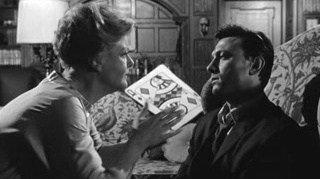 Failing to win over Jordan, Eleanor has another plan and suggests to her son, “Why don’t you pass the time by playing a little solitaire?” It’s now revealed that she is the American operative for the Communists. Unknown to her until now, Raymond proves to be the assassin, programmed in Manchuria. When Raymond sees the Queen of Diamonds, he follows his mother’s instructions: he is to kill the stubborn Jordan and, afterward, have no memory of his action.
Failing to win over Jordan, Eleanor has another plan and suggests to her son, “Why don’t you pass the time by playing a little solitaire?” It’s now revealed that she is the American operative for the Communists. Unknown to her until now, Raymond proves to be the assassin, programmed in Manchuria. When Raymond sees the Queen of Diamonds, he follows his mother’s instructions: he is to kill the stubborn Jordan and, afterward, have no memory of his action.
Surprised by Raymond’s late evening appearance, Jordan is standing in his bathrobe before an open refrigerator door, milk carton in hand. A bit of casual dialogue between the still calm Jordan and the robot-like Raymond:
“What’s that in your hand, Raymond?”
“Why, it’s a pistol, sir.”
“Is that a silencer?”
“Yes, sir, it is.”
Raymond shoots. The bullet punctures the carton and milk briefly spouts from the single hole until Jordan falls dead to the floor. Jocelyn, hearing a noise, comes in. Raymond kills her and indifferently steps over the body on his way out.
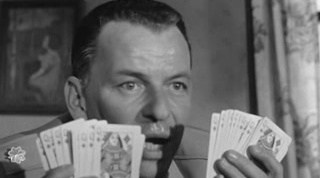 Having deduced the role of the solitaire game and the triggering influence of the Queen of Diamonds, Marco uses a deck of fifty-two queens to deprogram Raymond, drilling into him that the red card no longer has any power over him. “It’s over! The links, the beautifully conditioned links are smashed. They’re smashed as of now because we say so.”
Having deduced the role of the solitaire game and the triggering influence of the Queen of Diamonds, Marco uses a deck of fifty-two queens to deprogram Raymond, drilling into him that the red card no longer has any power over him. “It’s over! The links, the beautifully conditioned links are smashed. They’re smashed as of now because we say so.”
The phone rings. “It’s time for my American operator to give me the plan,” Raymond says. He answers. “Yes, I understand, mother.” As the convention reconvenes at nine for the acceptance speeches, Marco tells Raymond to call by 8:30 and let him know what he has been told to do.
Next, unaware of Marco’s meddling and with Raymond’s demeanor seemingly unchanged, Eleanor suggests another solitaire game and programs him to shoot “through the head” their party’s presidential nominee (Robert Riordan) two minutes into his speech, after a certain line. Disguised as a priest and provided with a sniper rifle, Raymond is to hide in an upper, unused spotlight booth at the convention center, Madison Square Garden.
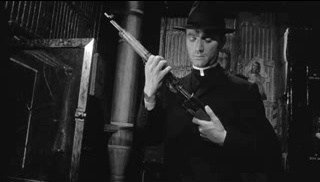 Eleanor Iselin vents both her rage and her political ambitions: “Raymond, . . . you must believe I did not know it would be you. . . . I’m on the point of winning for them the greatest foothold they would ever have in this country. I told them to build me an assassin. And they paid me back by taking your soul away from you. . . . And then when I take power, they will be pulled down and ground into dirt for what they did to you.”
Eleanor Iselin vents both her rage and her political ambitions: “Raymond, . . . you must believe I did not know it would be you. . . . I’m on the point of winning for them the greatest foothold they would ever have in this country. I told them to build me an assassin. And they paid me back by taking your soul away from you. . . . And then when I take power, they will be pulled down and ground into dirt for what they did to you.”
It appears Marco’s deprogramming has failed. Raymond enters the relatively empty Madison Square Garden before the delegates have arrived and takes up his position. As the time approaches, he opens the small window, turns on the overhanging bulb and, from its case, assembles the rifle.
Since Raymond has not called, Marco and Colonel Milt go to the arena. Marco looks about the building, now filled to capacity. Eleanor is sitting beside her husband, who, recently balloted as the vice presidential nominee, is nervously anticipating his dramatic elevation on the ticket that no speech will herald.
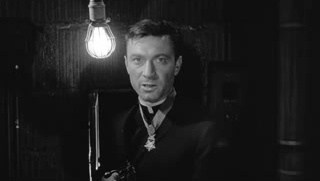 After the back lights have gone down, Marco sees a solitary square of light high in the back rafters. His race up the steps and through the building’s insides alternates with the progress on stage. The presidential nominee steps to the lectern. Raymond focuses the telescopic sights on him. The crucial line begins. It ends. The sights abruptly shift. Senator Iselin receives a bullet in the forehead, Eleanor the same.
After the back lights have gone down, Marco sees a solitary square of light high in the back rafters. His race up the steps and through the building’s insides alternates with the progress on stage. The presidential nominee steps to the lectern. Raymond focuses the telescopic sights on him. The crucial line begins. It ends. The sights abruptly shift. Senator Iselin receives a bullet in the forehead, Eleanor the same.
At that moment, Marco opens the door to the spotlight booth. “You couldn’t have stopped them,” Raymond says. “The Army couldn’t have stopped them. So I had to. That’s why I didn’t call. . . . Oh, God, Ben!” He turns the rifle on himself. The Medal of Honor, which has proven to be a fabrication of his brainwashers, is hanging around his neck.
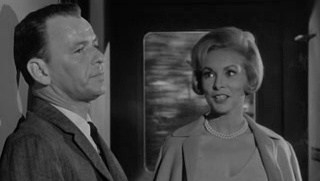 Much like her absence from this synopsis, Janet Leigh, Marco’s girlfriend Rosie, seems like a last-minute addition to the screenplay, dropped into the film as a possible red herring—maybe the Communist operative?—or at least a mole, in some way to deceive. Her character, however, is in Richard Condon’s novel, but in the film she seems unnecessary, adding nothing to the plot, providing no clues to the mystery, though it is a good performance. This was Leigh’s first starring role after the ground-breaking Psycho (1960).
Much like her absence from this synopsis, Janet Leigh, Marco’s girlfriend Rosie, seems like a last-minute addition to the screenplay, dropped into the film as a possible red herring—maybe the Communist operative?—or at least a mole, in some way to deceive. Her character, however, is in Richard Condon’s novel, but in the film she seems unnecessary, adding nothing to the plot, providing no clues to the mystery, though it is a good performance. This was Leigh’s first starring role after the ground-breaking Psycho (1960).
Eager to do The Manchurian Candidate from the start, Frank Sinatra considered the film his best, more so than even From Here to Eternity (1953), for which he received a Best Supporting Actor Oscar, or The Man with the Golden Arm (1955). His character on screen is as hard, in his own way, as is Laurence Harvey’s, a dark, somehow lonely portrayal. One-time bobbysoxer heartthrob of the ’40s, Sinatra is here every bit the dramatic film star, fully acclimated in this phase of his career and completely in command of both his part and the screen. He was not, on set, the usual controlling actor of his reputation, because, for one reason, he had complete confidence in his director.
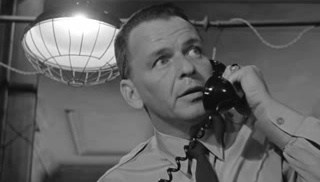 Like Sinatra, British actor Laurence Harvey was Frankenheimer’s choice from the first, long before preproduction. Harvey’s hard, angular face and stoic expression, even when supposedly “happy,” as during his reunion with a former girlfriend, and his ability to show either concentration or an intellectual vacancy, were elements essential to the character of Raymond Shaw. This aloof quality, an inbred part of Harvey’s personality, on and off camera, was what Frankenheimer wanted in Raymond Shaw—his “disdain” in the director’s word. Harvey was, indeed, perfect as a “most repulsive human being.”
Like Sinatra, British actor Laurence Harvey was Frankenheimer’s choice from the first, long before preproduction. Harvey’s hard, angular face and stoic expression, even when supposedly “happy,” as during his reunion with a former girlfriend, and his ability to show either concentration or an intellectual vacancy, were elements essential to the character of Raymond Shaw. This aloof quality, an inbred part of Harvey’s personality, on and off camera, was what Frankenheimer wanted in Raymond Shaw—his “disdain” in the director’s word. Harvey was, indeed, perfect as a “most repulsive human being.”
To play that other major character, the American traitor, Frankenheimer had insisted on Angela Lansbury. She had starred in one of his previous films, All Fall Down (1962), and he knew her worth. Her sprawling from her seat after being shot in Candidate, he said, was the best “fall” he had ever seen. She was Oscar-nominated for Best Supporting Actress—the only other Candidate nominee was film editor Ferris Webster. Although playing Raymond’s mother, Lansbury was only three years older than Harvey. Sinatra had suggested Lucille Ball for the role, an acute casting against type if ever there was one, but he graciously bowed to Frankenheimer’s judgment. And well that he did.
 Lansbury, playing Eleanor Iselin with cruel and incensed relish, is one of the great evil mothers of the movies. She is in the class with, perhaps above, Leopoldine Konstantin in Notorious (1946), who instigates the slow poisoning of her son’s (Claude Rains) enemy-agent wife (Ingrid Bergman); Katharine Hepburn in Suddenly, Last Summer (1959), who wants Elizabeth Taylor lobotomized so she wouldn’t reveal her son’s dark secret; and Faye Dunaway in Mommie Dearest (1981), who is unreasonably sadistic toward her daughter. These ladies, all, are subtle and sinister, rather than malicious axe-wielding matriarchs.
Lansbury, playing Eleanor Iselin with cruel and incensed relish, is one of the great evil mothers of the movies. She is in the class with, perhaps above, Leopoldine Konstantin in Notorious (1946), who instigates the slow poisoning of her son’s (Claude Rains) enemy-agent wife (Ingrid Bergman); Katharine Hepburn in Suddenly, Last Summer (1959), who wants Elizabeth Taylor lobotomized so she wouldn’t reveal her son’s dark secret; and Faye Dunaway in Mommie Dearest (1981), who is unreasonably sadistic toward her daughter. These ladies, all, are subtle and sinister, rather than malicious axe-wielding matriarchs.
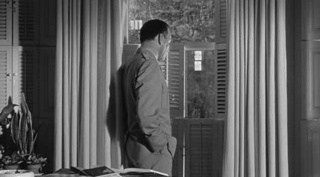 In the brief epilogue of The Manchurian Candidate, Marco looks out of a window spattered with rain—rain usually synonymous in the movies with any disquiet—and says to Rosie, “Poor Raymond, poor friendless, friendless Raymond.” He reads Raymond’s authentic, posthumous citation of bravery for his sacrifice in stopping the Iselins: “Made to commit acts too unspeakable to be cited here by an enemy who had captured his mind and his soul. He freed himself at last, and, in the end, heroically and unhesitatingly, gave his life to save his country.”
In the brief epilogue of The Manchurian Candidate, Marco looks out of a window spattered with rain—rain usually synonymous in the movies with any disquiet—and says to Rosie, “Poor Raymond, poor friendless, friendless Raymond.” He reads Raymond’s authentic, posthumous citation of bravery for his sacrifice in stopping the Iselins: “Made to commit acts too unspeakable to be cited here by an enemy who had captured his mind and his soul. He freed himself at last, and, in the end, heroically and unhesitatingly, gave his life to save his country.”
And then Marco’s final, disgusted, angry line: “Hell! Hell!”
